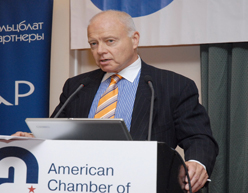AmCham hails Russia’s successful WTO negotiations conclusion as a historical feat

MOSCOW, Russia — As the World Trade Organization (WTO) working group in Geneva signed off on the final terms for Russia’s accession to the WTO today, the American Chamber of Commerce in Russia (AmCham) heralds this is as a key victory for Russia, American businesses in Russia, the American economy, U.S. jobs, and U.S. exports.
“This is an important, historical accomplishment,” said Andrew Somers, the president & CEO of AmCham, the largest foreign business organization operating in Russia, tasked with advancement of commercial relations between Russia and the international community in the country by promoting an investment-friendly environment. “This paves the way for Russia’s WTO accession in mid-December, and this has been an important goal of AmCham for many years. With WTO membership, Russia becomes more attractive to foreign investors and U.S. businesses considering the Russian market. For American companies already operating in Russia, it provides a stronger, more rule-based playing field for operations, as well as improved access and competiveness on this market.”
Experts project that the benefits of WTO accession for U.S. companies in Russia will be considerable. “They will include reducing or phasing out Russian import tariffs or quotas that now exceed WTO standards, as well as a ceiling on tariff rates that currently meet WTO requirements,” Somers said. “It’s also a great victory for Russia. Russia’s accession to WTO finally brings the only major economy not yet in the WTO into the rules-based international trade organization. And this should have a positive impact on foreign perceptions of Russia as an investment market.”
With the important achievement of today’s events in Geneva, and with Russia’s presumed WTO accession in December, according to AmCham, a remaining, related goal for U.S. businesses with operations in Russia is the withdrawal of the U.S.’s Jackson-Vanik Amendment, a law from the 1970s that was enacted in order to support emigration from the Soviet Union for prisoners of conscience and victims of religious persecution. “Russia’s free-emigration policy has been in compliance with the objectives of Jackson-Vanik for more than 20 years,” AmCham's President & CEO said. “Jackson-Vanik is entirely outmoded, and it’s bad for U.S. business in Russia.”
Under WTO rules, every WTO member must grant all other WTO members Permanent Normal Trade Relations (PNTR). Currently the U.S. only grants Russia temporary Normal Trade Relations on an annual basis, due to the amendment. This law requires the President to certify to Congress every year that Russia permits free emigration of its citizens. Accordingly, Congress then grants Russia another year of normal trade relations. If Jackson-Vanik remains applicable to Russia after Russia accedes to WTO, according to AmCham, the U.S. would be in violation of WTO rules, and as a consequence, U.S. companies would be denied the full enjoyment of Russia’s improved market access and tariff reductions.
“U.S. companies would be at a competitive disadvantage with respect to the products of other WTO members,” according to the head of AmCham. “That’s why AmCham and the majority of U.S. businesses operating in Russia support the withdrawal of Jackson-Vanik.”
Over the last year, AmCham has led monthly business delegations – or “door knocks” – during which Somers has traveled to Washington D.C. to meet with Congressmen and other key policymakers to discuss WTO and PNTR issues. During each of these visits, he has been accompanied by the heads of Russian operations of U.S. companies who discuss their significant success in Russia. Somers and members of the business delegations also outline for policymakers the direct and indirect connections between U.S. jobs and the Russian operations of American companies, as well as discuss how U.S. companies remain globally competitive by operating on the Russian market.












 Web design,
Web design,